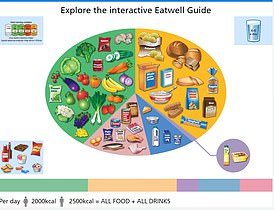Can FASTING protect you from Alzheimer’s disease? Research suggests the diet favored by Rishi Sunak could help
Fasting could potentially prevent Alzheimer’s disease, researchers suggested today.
Scientists from the University of Cambridge acknowledged that it was still ‘too early’ to prove their theory.
But they called it an “attractive idea,” based on new evidence showing that fasting can reduce inflammation in the body.
Inflammation is the body’s natural response to infection or injury. However, chronic inflammation, where the body fires inflammatory cells for no apparent reason, has been linked to conditions such as Alzheimer’s disease, Parkinson’s disease and type 2 diabetes.
It comes after it was revealed this week that Rishi Sunak is fasting 36 hours a week.
The Prime Minister, a self-confessed Coca-Cola addict, considers it an “important discipline” that allows him to to combat his ‘weakness for sweet things’.
Researchers from the University of Cambridge studied about twenty people who consumed water for just 24 hours

It comes after Rishi Sunak revealed he was fasting 36 hours a week to maintain a balanced lifestyle
For the new study published in the magazine Cell reportsCambridge experts studied about twenty people who consumed water for just 24 hours.
Volunteers ate a 500-calorie breakfast before 8 a.m. and then fasted for 24 hours.
During their fast, they were allowed to drink only water before consuming a 500-calorie breakfast the next day.
Blood samples were taken before fasting, at the end of the 24-hour period, and again after breakfast the next day.
The results showed rapidly increased levels in one day of a lipid called arachidonic acid, which stores energy and transfers information between cells.
As soon as people ate a meal again, arachidonic acid levels dropped.
Laboratory tests showed that higher levels of arachidonic acid reduced the activity of the NLRP3 inflammasome – an inflammatory cell strongly linked to Alzheimer’s and Parkinson’s disease.
As such, fasting appeared to reduce inflammation in the body.
Previous research had also shown that going 24 hours without eating could help reduce inflammation, but the reason why was not clear.
Although the observational study cannot confirm that the effects were caused by a fixed period of not eating, researchers claimed the result’highlights the health benefits of calorie restriction’.
Professor Clare Bryant from the University of Cambridge said: ‘This offers a possible explanation for how changing our diet – particularly through fasting – protects us against inflammation, especially the harmful form that underlies many diseases associated with a Western high-calorie diet.
‘It is still too early to say whether fasting protects against diseases such as Alzheimer’s and Parkinson’s, because the effects of arachidonic acid are only short-lived.
‘But our work adds to a growing body of scientific literature pointing to the health benefits of calorie restriction.
‘It suggests that regular fasting over long periods of time may help reduce the chronic inflammation we associate with these conditions. It’s certainly an attractive idea.’
The team said their findings also indicate that a high-calorie diet could increase the risk of these diseases.
Previous sStudies have shown that high-fat diets increase inflammatory activity.
Professor Bryant said: ‘There could be a yin and yang effect here, with too much of the wrong thing increasing inflammatory activity and too little decreasing it.
“Arachidonic acid could be one way this happens.”
The researchers said they may also have discovered how aspirin works.
The painkiller prevents arachidonic acid from being quickly broken down by the body, which can increase its concentration and thereby reduce inflammation, they said.
Professor Bryant said: ‘It is important to emphasize that aspirin should not be taken to reduce the risk of long-term illness without medical supervision as it can have side effects such as stomach bleeding if taken over a long period of time.’
One type of fasting, also called intermittent, involves periods of time when you don’t eat for parts of the day or week.
It has been found to encourage the body to burn excess body fat, resulting in weight loss and lowering the risk of heart disease, type 2 diabetes and high cholesterol.
Options include the 5:2 diet, where you eat 500 to 600 calories two days a week and eat a healthy diet the remaining five days, or the 16:8 diet, where you eat meals within eight hours and eat the remaining 16 hours fast. o’clock.
Fasting allows the body to use stored energy by burning excess body fat, resulting in weight loss.
However, side effects include headaches and high hunger levels during fasting.
The Prime Minister yesterday set out his own weekly 36-hour fasting habit – from 5pm on Sunday to 5am on Tuesday – to maintain a ‘balanced lifestyle’.
However, he admitted that he has a sweet tooth and indulges in sweet treats during the week.

